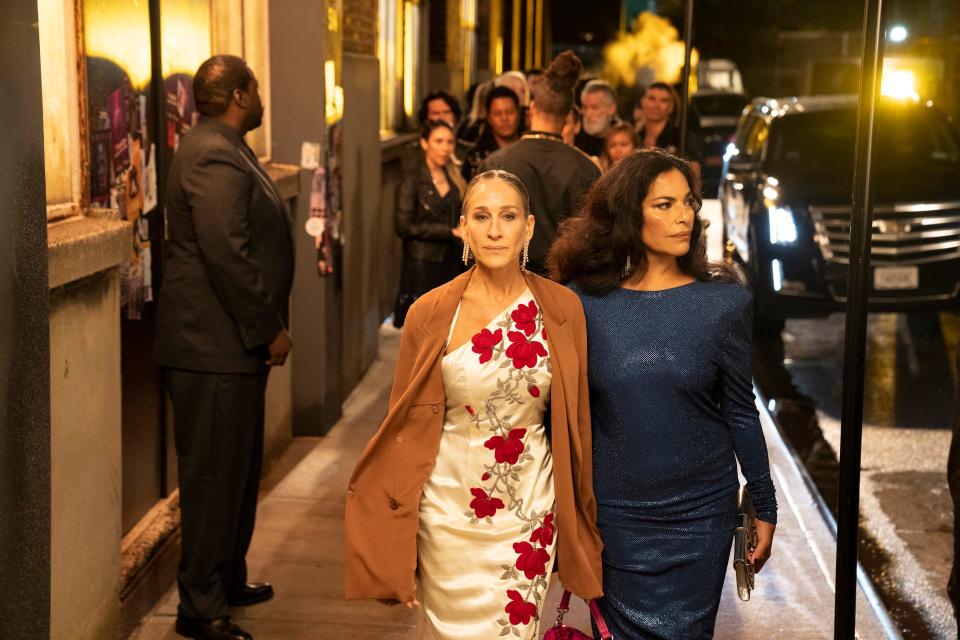‘And Just Like That’ finale: We couldn’t help but wonder … what was the point?

Spoiler alert! Contains major details about the season finale of "Sex and the City" reboot "And Just Like That" (now streaming on HBO Max).
Like Carrie Bradshaw at a charity runway show, "And Just Like That" fell flat on its face.
More so than many other critics, we were initially intrigued – even charmed – by Michael Patrick King's much-anticipated "Sex and the City" revival, which concluded its first season on HBO Max Thursday (all episodes now streaming).
Arriving nearly two decades after "Sex and the City" ended its six-season HBO run, the new series began with Carrie losing husband Mr. Big (Chris Noth) to a Peloton-induced heart attack. Close friends Miranda (Cynthia Nixon) and Charlotte (Kristin Davis) were by her side at his funeral in the second episode, while an MIA Samantha (Kim Cattrall, who chose not to return for the revival) sent flowers.
It was a grim place to start this new chapter, and at first blush, we admired the writers' ambition to break from the tidy “lesson of the week” format of the original “Sex and the City" with weightier, more drawn-out storylines.
Initial take: 'And Just Like That…' review: 'SATC' reboot is high-fashion fan service – and mostly wonderful

The revival tackles complex issues of grief, sexuality, alcoholism and gender identity from the perspectives of primarily middle-aged women, who still make up just a quarter of all characters over 50 on screen, according to a 2020 study by the Geena Davis Institute on Gender in Media. It also nobly aims to course-correct the original series' overwhelmingly white and mostly heterosexual depiction of New York by adding women of color and nonbinary characters in supporting roles.
But in trying so hard to separate itself from its predecessor, "And Just Like That" lost all sense of dynamism and wit, rendering fan-favorite characters nearly unrecognizable compared to their past selves.
Despite Parker's innate charisma, the writers made Carrie more pitiable than aspirational: the kind of person who berates her loud neighbors in the middle of the night, pees in bed while recovering from hip surgery and spends an entire episode trying to find the source of a mysterious beeping sound in a potential new apartment. Bereft of her wide-eyed optimism and can-do spirit, the formerly adventurous sex columnist spends her days wallowing in misery and reminding everyone around her that she has a dead husband, which trumps any problem they might be facing.

It's not until the very last scene of the season finale – after a series of bummer dates with a well-meaning widower (Jon Tenney) and a trip to Paris, where she scatters Big's ashes – that we finally see a spark of the old Carrie, as she spontaneously makes out with her new podcast producer in an elevator.
Speaking of Paris: The entire season seemed to tee up the possible return of Samantha, who now lives in Europe but still texts with Carrie sporadically. Hoping to mend their strained friendship, Carrie invites Samantha out for drinks while she's in France, to which Samantha replies, "Tomorrow night?"
But viewers never get to actually see their implied reunion because the next scene immediately cuts to Carrie back in New York.
More: The 'Sex and the City' reboot is finally here! What we know about 'And Just Like That'
Keeping Samantha around via text is, at best, a cheap cop-out, and at worst, disrespectful to Cattrall, who has publicly and repeatedly distanced herself from both the new show and Parker.
It also shows a lack of faith in the new characters, two of whom – the glamorous real estate agent Seema (Sarita Choudhury) and well-connected documentarian Lisa (Nicole Ari Parker) – are ostensibly there to fill Samantha's shoes. But aside from a secondary plot about Miranda's new friend Nya Wallace (Karen Pittman) and her infertility struggles, none of the other women of color are given screen time to themselves, and only seem to exist in relation to Carrie or Charlotte.

Che Diaz (Sara Ramirez) – a nonbinary stand-up comic who’s become a reliable source of meme material for her “comedy concerts” and insistence that she’s “done a lot of weed” – similarly lacks any meaningful character development. Instead, they’re only there for Miranda to explore her sexuality and recklessly implode her marriage to Steve (David Eigenberg), who’s been bizarrely downgraded to a clueless, platonic house husband.
The show’s treatment of Steve and Miranda, as well as Che’s stilted platitudes meant to pass for queer comedy, have been ruthlessly mocked on social media. But the new couple is here to stay, at least in the near term: In the finale, Miranda decides to move to Los Angeles to join Che, who is shooting a sitcom pilot.
We’ll undoubtedly watch the inevitable Season 2, although the first 10 episodes of “And Just Like That” haven’t inspired much confidence for what lies ahead for Carrie and Co.
Then again, we couldn’t help but wonder: Are our preconceived notions of who these characters should be preventing us from liking who they could become? Miranda says as much in the season finale, seeming to address criticisms head-on in a confrontation with Carrie over moving to LA.
"Am I not allowed to change a little bit? Or a lot? Or change back again if I feel like it?” she says. “Do I have to follow my own rigid rules until the day that I die?"
“And Just Like That” certainly threw out the rule book in its first outing. But it also never truly made the case for its own existence.
This article originally appeared on USA TODAY: 'And Just Like That' finale: 'Sex and the City' revival loses charm
Solve the daily Crossword

